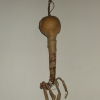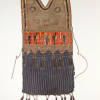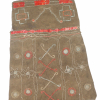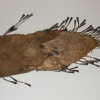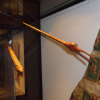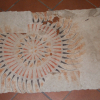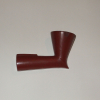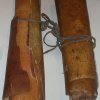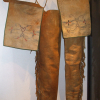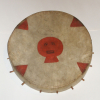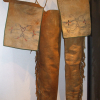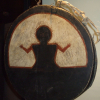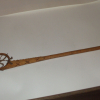Relatives/Heritage items
Displaying 3581 - 3600 of 4694 Relatives
Browsing allows you to see all the records for relatives and heritage items in the GKS. You can also search by material made, and/or filter by nations. To search by material made, type the material's name, by example 'leather', in the box below and click “Apply.” You can select multiple nations from the dropdown list by pressing “Ctrl” (on PC) or “Command” (on Mac) and clicking, then select “Apply.”
A rawhide rattle with a wooden handle. Probably Santee Sioux (Eastern Dakota). Collected by G.C. Beltrami in Wisconsin in 1823. Beltrami's collection catalogue states that around 1856, Beltrami's nephew donated several objects to the Civic Library of Bergamo, which were later transferred to the Museo
A shoulder bag made of hide and fabric, decorated with quillwork and metal tinkle cones cones. Three animals (dodems) are embroidered on the front part, along with what may be two eagles, and thunderbirds below. The front portion of the bag covered in cloth was
An Anishinaabe hide bag decorated with quillwork on the front side, decorated with the otter tail motif, crosses and circles. Collected by G.C. Beltrami in Wisconsin in 1823. Around 1856, Beltrami's nephew donated several objects, including this one, to the Civic Library of Bergamo. Later
Several weapons, including a club, bows and arrows. Probably Great Lakes. Collected by G.C. Beltrami in Wisconsin in 1823. Beltrami's collection catalogue states that around 1856, Beltrami's nephew donated several objects to the Civic Library of Bergamo, which were later transferred to the Museo Civico
A blackened hide double sheath decorated with porcupine quillwork, with two wooden tools. Probably Anishinaabe. Collected by G.C. Beltrami in Wisconsin in 1823. Around 1856, Beltrami's nephew donated several objects, including this one, to the Civic Library of Bergamo. Later the collection was transferred to
A Great Lakes pouch made of hide with fringes wrapped with dyed porcupine quills and terminating with metal cones. Collected by G.C. Beltrami in Wisconsin in 1823. Around 1856, Beltrami's nephew donated several objects, including this one, to the Civic Library of Bergamo. Later the
A wooden courting flute with one finger hole. The bottom opening is carved in the shape of a bird with its head painted red. Collected by G.C. Beltrami in Wisconsin in 1823. Vigorelli, the Beltrami Collection catalogue's author, describes it as a Santee Sioux courting
A wooden courting flute, probably made by a Sioux artist. The end is carved in the shape of an animal's head, possibly a fish, with eyes made of commercial brass nails and zig zag motifs extending from its mouth. Collected by G.C. Beltrami in Wisconsin
An Eastern Sioux or Dakota quilled cradleboard ornament. Collected by G.C. Beltrami in Wisconsin in 1823. Beltrami's collection catalogue states that around 1856, Beltrami's nephew donated several objects to the Civic Library of Bergamo, which were later transferred to the Museo Civico di Scienze Naturali
A piece of hide decorated with geometric motifs done in red vermillion and black and green pigments. This may have been a Sioux woman's garment or a fragment from a garment. Collected by G.C. Beltrami in Wisconsin in 1823. Beltrami's collection catalogue states that around
A catlinite pipe bowl with a wooden stem, possibly Northern Plains. Collected by G.C. Beltrami in Wisconsin in 1823. Beltrami's collection catalogue states that around 1856, Beltrami's nephew donated several objects to the Civic Library of Bergamo, which were later transferred to the Museo Civico
A fragment of a men's summer cloak decorated with circle and triangle motifs in red and black. Northern Plains, possibly Sioux. Collected by G.C. Beltrami in Wisconsin in 1823. Beltrami's collection catalogue states that around 1856, Beltrami's nephew donated several objects to the Civic Library
A fragment of hide, which might have been used as a tipi door. It is decorated with red, black and green geometrical motifs, which may represent a village. Northern Plains. Collected by G.C. Beltrami in Wisconsin in 1823. Beltrami's collection catalogue states that around 1856
A catlinite pipe bowl with its wooden stem, possibly Northern Plains. Collected by G.C. Beltrami in Wisconsin in 1823. Beltrami's collection catalogue states that around 1856, Beltrami's nephew donated several objects to the Civic Library of Bergamo, which were later transferred to the Museo Civico
Two birch bark scrolls, probably Anishinaabe. Collected by G.C. Beltrami in Wisconsin in 1823. Around 1856, Beltrami's nephew donated several objects, including this one, to the Civic Library of Bergamo. Later the collection was transferred to the Museo Civico di Scienze Naturali, its current location.
A pair of tanned hide leggings. The museum documentation suggests they are from the Northern Plains, possibly Santee Sioux (Eastern Dakota). Collected by G.C. Beltrami in Wisconsin in 1823. Beltrami's collection catalogue states that around 1856, Beltrami's nephew donated several objects to the Civic Library
A single headed drum with a red manitu head centered in an area that can be read as an equal-armed cross superimposed on the circle formed by the perimeter of the drum. The museum catalogue for this item attributes it to the "Santee Sioux" (Eastern
A tanned hide loincloth decorated with quillwork. Collected by G.C. Beltrami in Wisconsin in 1823. Around 1856, Beltrami's nephew donated several objects, including this one, to the Civic Library of Bergamo. Later the collection was transferred to the Museo Civico di Scienze Naturali, its current
An Anishinaabe double-headed drum with an image of a manito with its head radiating light on one side and an elaborate sun motif on the other. Collected by G.C. Beltrami in Wisconsin in 1823. Around 1856, Beltrami's nephew donated several objects, including this one, to
A lacrosse stick with four "X" motifs burned on one side, and four pairs of parallel lines burned on the other side. The stick has been attributed to the Chippewa, or the Anishinaabe, based on manufacturing techniques. Collected by G.C. Beltrami in Wisconsin in 1823
 Knowledge Sharing Platform
Knowledge Sharing Platform

